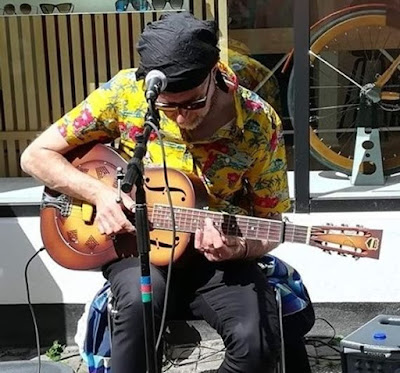This interview was first published in fRoots magazine No. 414. December 2017.
How time flies, eh? It’s now thirty years since great swathes of the UK music and style press became incontinent with excitement over something called ‘Madchester.’ What’s too-often overlooked is the fact that 185 miles south of England’s precipitation capital, something very different was stirring. It’s true. For a few glorious years, the centre of the musical universe was actually located somewhere on the Berkshire section of the M4 Corridor. OK, that’s really my truth, but I do have some documentary evidence on my side. The region’s network of pubs, clubs and Arts Centres, and tribal gatherings like the Bracknell Folk Festival and WOMAD in Reading proved a fertile breeding ground for a generation of post-punk musical adventurers weaned on folk and blues and intoxicated by the new-fangled World Music records that were emerging
One such was Mark Turauskis, who first caught the nation’s ear via the seminal 1988 Cooking Vinyl compilation The Cutting Edge. Latterly he’s recorded solo, as Mark T. & The Brickbats and with various musicians including Tim Hill and Charles Spicer. His latest release, From Blues To Rembetika is an understated beauty that reveals the artist’s engaging personality through some of his enduring influences.
“This album has been a long time coming,” Mark tells me over a mug of tea, the morning after a Cornish folk club gig. Ever since I made From Middle East To Mid-West for Waterfront Records in 1987, in fact! After that, Steve Hooker, who managed my stuff on Waterfront came up and said I should really make a blues album next but I didn’t, until now. I hung around with Mike Cooper an awful lot in the early 80s and he was introducing me to African music, to rembetika, and all sorts of other stuff. I needed to go ahead and get all of these things out of my system, rather than just making a straight blues album then. People are always saying that rembetika is the Greek blues so I thought why not do the two styles together? Everything was done very quickly, just recording two or maybe three takes of each song and choosing the best one. I ended up recording about twenty-five tracks and just edited them down to the ones that worked best together. In the Brickbats days I used to relish being in studios, but now playing live is the main thing for me. In 2009, I saw that Martin Carthy was on at the Lewes folk club so I turned up there and they gave me a floor spot. Martin was in his element and it was amazing - a real ‘road to Damascus' thing that eventually became the Folk Songs & Ballads CD”.
Playing live is something that Mark is now able to do more of, following many years of working in Community Music.
“There was a lot of community funding from the millennium through to the crash in 2009” he explains, “and we were able to do really big, long term music projects. Community music died a death as soon as the Olympics were announced. All the funding was just cut and pasted into that and we just didn’t exist any more. I now work two days a week, which has enabled me to live and raise a family through the leaner gigging times.”
As conversation drifts back to those Thames Valley days of the late 1980s, I ask Mark for his abiding memories and impressions of the scene.
“Those (1987 and ’88) Bracknell Folk Festivals were a real catalyst and gathering point,” he considers. “I think it’s no surprise that people like Blowzabella, Mike Messer and myself were all at the same festival, because we all had a similar musical world view. There were so many of us that came through who were waiting in the wings and wanted to be in the folk scene, but really didn’t have that mentality of trying to do a song exactly like Fred Jordan. We either didn’t have that kind of patience or maybe we were so far down the line it was just accepted as a given that these songs were there - we didn’t need to save them! So we could just go and integrate traditional songs with other stuff that we liked that was becoming available. The big thing about punk that informed all of my generation of players was the idea that if you can’t go and do this in a folk club, just go out and do it anyway. You’ve got a choice. You can either sit around and think about it and grumble that the door’s closed to you or you can just go out and make your own scene. With me it was a bit of both, really. Someone left the door slightly open and I crept in!”



